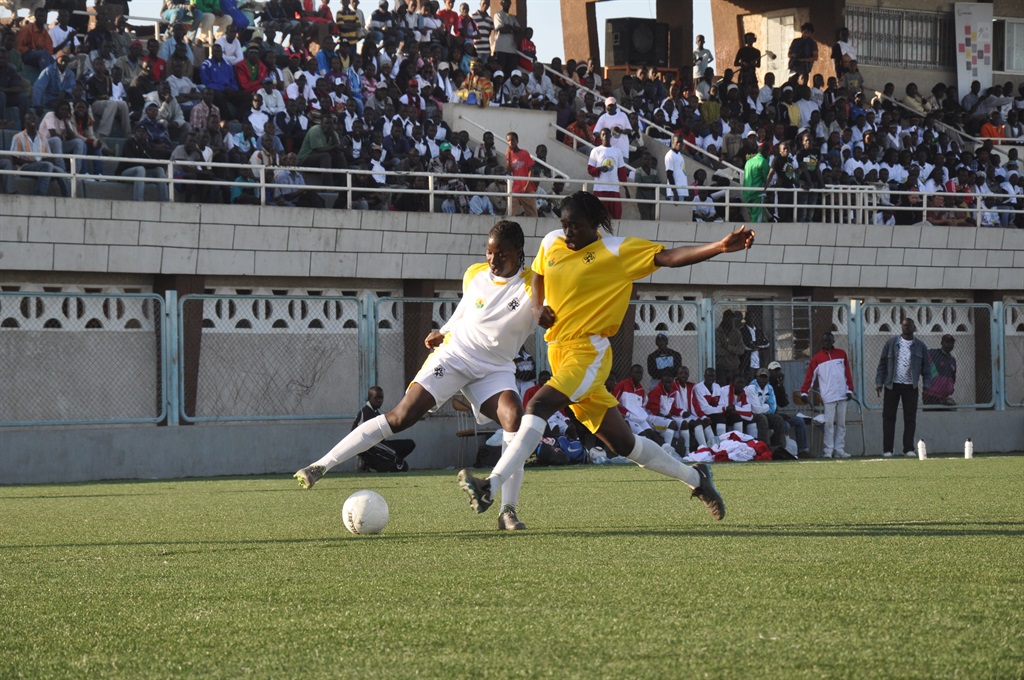
The smell of charcoal and fried fish lingers in the air as a group of girls make their way through the crowded streets of northern Dakar. Donned in blue and white football kits, they attract unwanted attention upon arriving at an open space barely big enough to be a football pitch.
“You should be inside cleaning, not playing football,” shout a group of boys. One of the girls, shrugging off such opinion, scatters crushed charcoal to outline the goalposts and launches a football into the air.
Sadly the jeers and attitudes of these young men are common in Senegal.
Across the country, traditional gender roles are ingrained in national psyche and enforced from a very young age. Despite Article 31 of the United Nation’s Convention on the Rights of the Child stating that all children have the right to play, Senegalese daughters are expected to carry out most household tasks, leaving little time for leisure activities.
Seyni Ndir Seck is well acquainted with such a childhood. President of Ladies’ Turn – a nonprofit organisation working to promote female football across the country – Ndir Seck grew up hiding her football practice from her parents.
“It’s never been easy for women of our generation to play football in Senegal or elsewhere,” said the 38-year-old and former captain of Senegal’s national women’s football team.
Ladies’ Turn is out to level the playing field for aspiring girl footballers. Launched in 2009, the project is the fruit of a friendship between three women: Ndir Seck, American Jennifer Browning and Senegal-based Cameroonian sports journalist Gaelle Yomi.
The trio, often referred to as the “triangle of fire”, met when Browning – working for the United Nations Development Programme – received an initial grant to fund a football project. During the period of Navétanes (a holiday football season meaning winter championship in Wolof), Browning was surprised to see no women out playing, especially as in her native US football is primarily a women’s sport.
Shocked by this practice, Browning and her two colleagues “organised a tournament, which proved a success. This is how we came to set up an association that would run this tournament seasonally,” explained Ndir Seck.
This first tournament in 2009 saw more than 400 teenage girls participate. Now Ladies’ Turn works in 11 regions of the country and teams meet up to five times a week during the training season. In 2017 more than 200 girls took part in regular training sessions across the country, and 100 girls have already registered for the upcoming tournament in January 2018.
Football has a real impact on girls’ lives both on and off the pitch. The organisation recognises that women’s football is a powerful tool for promoting gender equality, both by empowering the girls who play and by presenting women in new roles as athletes.
Girls learn the importance of teamwork and build their self-confidence and leadership skills. Some of the girls have even gone on to become Ladies’ Turn trainers themselves. Practice takes place in public places, enabling girls to showcase their talents, form an identity outside of the home and openly abolish any misconceptions about girls in sport.
“We are women. We want to have the same status as men,” said a girl from the team representing Koumbal, a region in Senegal.
Off the pitch, Ladies’ Turn faces a tough defensiveness from all sides – opposition and financial worry. Bassouré Diaby, head coach of Senegal’s national women’s team and site coordinator for Ladies’ Turn in Saint Louis (Senegal’s second city), was overwhelmed by the local community’s level of unhappiness.
“Not everyone agrees with what we are doing, but I still wasn’t expecting this much resistance,” he said.
Regarding the financial side of things, Ladies’ Turn has been fortunate to obtain partnerships with the British Council and Canadian Embassy in Senegal, but for the time being this is not sufficient because the eight staff work on a volunteer basis.
Keeping their eyes on the goal, the female trio have big plans for the future. With Ndir Seck having recently been elected as president of the Women’s Football Commission at the Senegalese Federation for Football the hope is that, in addition to continuing her work with Ladies’ Turn, she will be able to push for changes in how official women’s football is organised across the country.
One big goal is to use football as a way to support girls through their secondary education and to create overseas partnerships.
For the time being, Ndir Seck remains optimistic that both Ladies’ Turn and its girls will go from strength to strength.
The media play a crucial role in shaping the national and international narrative around women’s lives. That is why the social enterprise Sparknews has created Women in Action, and has invited nine media partners, including City Press, to participate in a month-long programme highlighting solutions to reduce gender inequality. Each week, readers from France, Switzerland, the UK, Burkina Faso, Nigeria, Senegal, South Africa, Bangladesh and India will discover initiatives from around the world concerning women in different domains. This article is from the Women in Action campaign.




 Publications
Publications
 Partners
Partners









